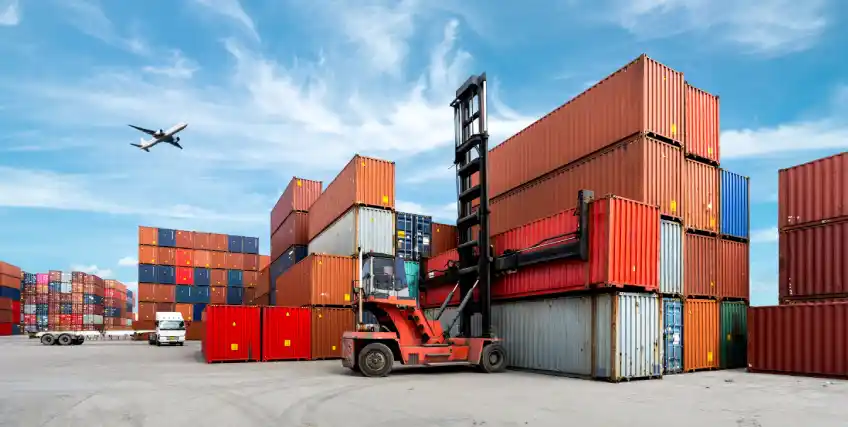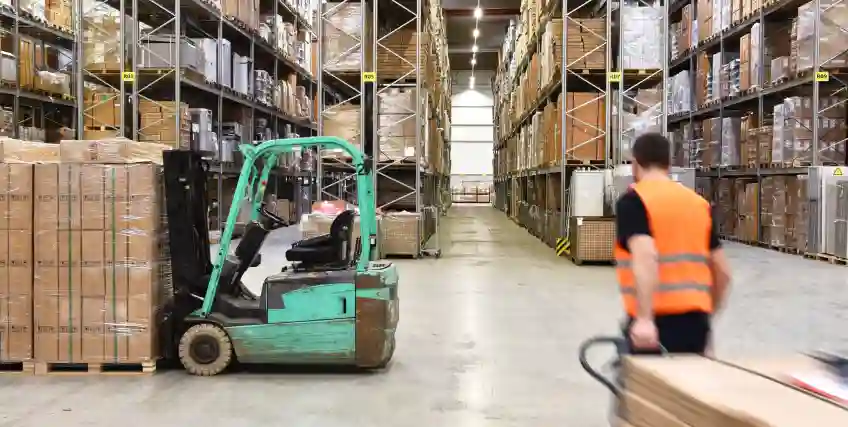How to Get a Business Loan for Your Logistics Startup
Aug 29, 2025 | Last Updated on: Sep 01, 2025

Starting a logistics business requires an adequate amount of working capital along with a good business idea. It also needs wheels on the road, necessary permits, fuel, staff, and above all, cash.
In today’s economy, access to capital can either make or break a small logistics company. The best part is that you don’t have to bootstrap your startup entirely on your own. As a result, smart financing for logistics startups can help cover costs, improve cash flow, and position you to take on more deliveries with confidence.
In this article, we’ll discuss the different options for financing for logistics startups, how to qualify for startup financing, and how to apply for different business loans for startups.
Why Financing for Logistics Startups Is Important
Every logistics startup typically faces high operating costs from day one of the business. Hence, business funding for a startup business helps bridge the gap between ambition and execution.
Here’s why financing for logistics startups is important:
- Fleet Costs: Trucks, trailers, and delivery vans don’t come cheap. A single Class 8 truck can cost over hundreds of thousands of dollars. Hence, business financing for logistics startups can help.
- Working Capital: Fuel, tolls, payroll, and maintenance require regular cash flow. Therefore, small business owners can use startup trucking business loans for working capital.
- Delayed Payments: Many shippers pay invoices 30 to 60 days after delivery. Business financing for logistics startups can ease this delay.
- Business Growth: Contracts with retailers or suppliers may need upfront capacity, like hiring drivers or adding vehicles. Funds from business financing can be used to meet this demand.
Since the pandemic, disruptions in global trade have impacted supply chains, increasing the need for accessible startup financing. Therefore, business financing for logistics startups is important to manage last-mile delivery or warehousing operations.
Understanding the Basics of Business Financing for Logistics Startups
It’s important to know the basics of business financing for logistics startups as this can help you avoid mistakes and choose the right financing option. Additionally, small business loans for transportation give you access to working capital that can help your business grow.
Some of the important factors of business financing include:
- Interest Rate: The cost of borrowing. Lower is better.
- Loan Term: How long you have to repay, short-term loans last a few months, while long-term can stretch years.
- Collateral: Something the lender can claim if you default, like a truck.
- Credit Score: Personal and business credit scores affect your loan approval.
- Repayment Terms: Weekly, bi-weekly, or monthly payments with fixed or variable rates.
Hence, startup trucking business loans often come with specific conditions. Understanding these terms when considering financing for logistics startups helps you prepare for conversations with lenders and helps you compare offers fairly.
Types of Financing for Logistics Startups
When choosing the right business financing for logistics startups, understand that not all funding options are created equal. Different loans serve different business needs.
Here are some of the popular business financing options for logistics startups and supply chain providers.
Term Loans
A term loan is a traditional form of business financing that provides a lump sum loan amount, that can be repaid over a set period of time. These loans often come with fixed interest rates along with fixed repayment terms.
Logistics businesses can use term loans to buy trucks, open new terminals, or expand into new regions. This business financing for logistics startups is especially useful for trucking companies or freight forwarding providers who need to make substantial upfront investments in equipment or infrastructure.
Equipment Financing
Equipment financing is a funding solution designed specifically to purchase business-related assets including tools and machinery. Instead of paying upfront for the equipment, borrowers can pay in easy monthly payments. Also, the equipment itself serves as collateral, reducing the risk for the lenders.
Logistics startups can use equipment financing to purchase physical assets like trucks, forklifts, or GPS systems. Also, it can be used for setting up operations or expanding existing fleets. Whether it’s a refrigerated trailer or advanced tracking software, having the right tools improves efficiency and helps with automation and optimization. Hence, this type of business financing for logistics startups ensures that they can operate smoothly without needing to pay full costs upfront.
Business Line of Credit
A business line of credit is a flexible funding option that offers quick access to funds when needed up to a set credit limit. Borrowers can draw funds when they need them and pay interest only on the amount used. This financing option works similar to credit cards, but often comes with lower interest rates.
Logistics startups can use a line of credit for covering short-term business needs such as fuel, tolls, warehousing fees, or emergency repairs. Also, one last-mile delivery companies can use this business financing to meet payroll while waiting for pending invoices to clear.
SBA Loans
SBA loans are one of the most popular financing options available for small businesses that are guaranteed by the U.S. Small Business Administration. These loans often come with lower interest rates and longer repayment terms. Also, these small business loans are ideal for startups or early-stage logistics companies with a solid business plan.
Logistics businesses can use SBA loans for startup costs, purchasing vehicles, or investing in technology and warehousing. Also, this business financing for logistics startups can be used by transportation providers who are looking to scale responsibly.
Invoice Financing
Invoice financing allows you to turn unpaid invoices into quick cash by selling them to a lender or factoring company. You get a large percentage of the invoice value upfront, and the remainder (minus fees) when your customer pays. This can help maintain liquidity without taking on new debt.
In the logistics industry, especially in freight forwarding or supply chain management, clients often take weeks to pay. This delay can hurt cash flow. Invoice financing gives logistics startups the working capital they need to manage operating costs, pay staff, or accept new delivery contracts, without waiting on payments.
Merchant Cash Advance (MCA)
A merchant cash advance isn’t a loan in the traditional sense. Instead, it’s a cash advance based on your business’s projected sales. You receive funds quickly, and repayment is automatically deducted from your future daily or weekly sales, plus fees.
For logistics businesses, MCAs can be a lifeline during emergencies. If a truck breaks down or a route expansion is delayed due to cash issues, an MCA can provide fast access to funding. While convenient, MCAs typically come with higher costs and should be used cautiously.
How to Qualify for Funding for a Startup Business
Getting approved for business financing for logistics startups depends on preparation and proof that your business is worth the investment.
Most lenders will check:
- Credit Scores: Aim for 670 or above for better loan rates.
- Business Plan: Include revenue projections, market demand, and your competitive edge.
- Licenses and Permits: DOT number, MC authority, and insurance.
- Collateral: Vehicles or equipment you already own.
- Revenue Proof: If you’re operational, show contracts or invoices.
Early-stage logistics startups should focus on creating a business model that embraces digitization, forecasting, and real-time route optimization.
Moreover, having industry experience also boosts your credibility when seeking business financing for logistics startups. Even if you’re new to entrepreneurship, a background in freight, dispatch, or fleet management can help.
How to Apply for Startup Trucking Business Loans
Applying for business financing for logistics startups can feel overwhelming at times. However, breaking it into steps makes it manageable.
Here’s how you can apply for business financing for logistics startups:
- Identify Your Need: Know what the funds will cover, fleet, payroll, fuel, etc.
- Research Lenders: Compare banks, online lenders, SBA partners, and logistics-friendly fintech firms.
- Prepare Your Documents: Gather your business plan, licenses, bank statements, tax returns, and equipment quotes.
- Apply Online or In-Person: Choose the lender and loan type that fits your business model.
- Review Loan Offers: Understand the APR, repayment schedule, fees, and conditions.
- Accept and Use Funds Wisely: Stick to your funding goals to maximize your return.
Pro Tip: Take your time comparing startup financing offers to avoid high-interest debt.
The Bottom Line
Starting a logistics business is no small feat. However, you don’t have to carry the financial weight alone.
There are various options for business financing for logistics startups to help you buy trucks, cover costs, and grow faster. From SBA loans to crowdfunding, there’s a solution to every challenge, especially for entrepreneurs in the logistics industry.
Modern logistics startups must focus on areas like warehousing, freight forwarding, and supply chain management, while also embracing sustainability, artificial intelligence, and machine learning to remain competitive.
So, if you’re ready to move your logistics startup forward, explore loans for startups and discover the best financing options for your business needs.
FAQs About Financing for Logistics Startups.
What kind of loan works best for a logistics startup?
The ideal loan depends on your specific business needs, stage of business, and financial situation. Some logistics startups benefit from term loans when making large purchases, while others prefer a line of credit for more flexible, short-term funding. Therefore, exploring several financing options might help you determine what fits best.
How much working capital does a logistics business typically need?
There’s no universal amount, as working capital varies depending on your operating scale, location, and services offered. Startups in freight forwarding or last-mile delivery may require more upfront capital due to equipment needs and fluctuating fuel costs. So, it’s better to create detailed cash flow forecast for better insights.
Can I get approved for a loan if my startup is new?
Getting approved for business financing for logistics startups can be possible, though it may require additional documentation such as a solid business plan, personal credit history, or proof of contracts. Some lenders focus on early-stage businesses, while others might expect a few months of operating history.
What if I don’t qualify for traditional loans?
There are other funding routes to consider. Some entrepreneurs explore equipment financing, invoice factoring, or crowdfunding platforms. In some cases, partnerships with investors or venture capital firms might also be an option, depending on your business model and growth strategy.
What should a logistics business include in a business plan when applying for a loan?
A business plan often helps to outline your service offerings, market demand, competitive advantage, and revenue projections. Lenders usually want to understand how you plan to generate income and manage operating costs. Also, having clear insights into your supply chain and logistics operations may also strengthen your application.
Frequent searches leading to this page
Term Loans are made by Itria Ventures LLC or Cross River Bank, Member FDIC. This is not a deposit product. California residents: Itria Ventures LLC is licensed by the Department of Financial Protection and Innovation. Loans are made or arranged pursuant to California Financing Law License # 60DBO-35839




